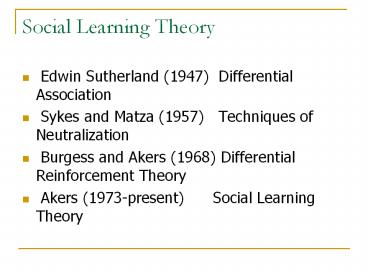Social Learning Theory - PowerPoint PPT Presentation
Title:
Social Learning Theory
Description:
Social Learning Theory Edwin Sutherland (1947) Differential Association Sykes and Matza (1957) Techniques of Neutralization Burgess and Akers (1968) Differential ... – PowerPoint PPT presentation
Number of Views:566
Avg rating:3.0/5.0
Title: Social Learning Theory
1
Social Learning Theory
- Edwin Sutherland (1947) Differential
Association - Sykes and Matza (1957) Techniques of
Neutralization - Burgess and Akers (1968) Differential
Reinforcement Theory - Akers (1973-present) Social Learning Theory
2
Differential Association
- Edwin Sutherland
- Ph.D from University of Chicago, 1913
- Focused on Chicago School question how are
delinquent cultures transmitted across
generations? Published and revised in his
textbook from 1934-1947 - Differential Association
- A general theory for all types of crime
- Final version stated in nine principles
3
Differential Association
- 1. Criminal behavior is learned (it is not
invented) In interactions with others in
intimate groups - 2. Differential associations vary Intensity,
priority, duration, frequency - 3. Learning includes (a) techniques (b)
attitudes that are contained in definitions of
the legal code - 4. Delinquency is caused by an excess of
definitions in favor of law violation - 5. Learning criminal behavior involves the same
processes and mechanisms as other behaviors
4
Criticisms of D.A.
- What are Definitions in favor of law violation?
- Attitudes that unconditionally approve crime?
- Rationalizations that justify crime in some
cases? - Attitudes that are conducive to crime?
- How exactly is crime learned?
5
Sykes and Matza
- Techniques of Neutralization
- Attempt to elaborate/test Sutherlands theory
- Denial of victim
- Denial of injury
- Condemn the condemners
- Appeal to higher loyalties
- Not attitudes that require crime, but rather
excuse or justify in some cases
6
D.A. to Social Learning
- Burgess and Akers (1966)
- Differential Reinforcement Theory
- Added Operant conditioning (reinforcers/punishers)
- Akers Social Learning Theory (1973-present)
- Added Vicarious learning, made modifications
7
Concepts in S.L.T.
- Differential Association
- Definitions
- Differential Reinforcement
- Imitation
8
Hmmm....He never missed game winners when he
played for the Packers....must be the purple
uniform.
Its still Sept, but better to be 2-0 than 1-1
(and to have lost to the Lions).
9
Social Learning Theory (Akers)
Exposure to definitions or different role
models
Balance of definitions or role models produces
initial behaviors
Positive or negative reinforcement
Definitions Behaviors Role models
R(/-)
DA
10
Exposure to Delinquent Peers
- Why S.L. measure?
- Strength of Relationship
- Rs .2 - .4 are common
- Criticisms
- Measuring delinquency twice
- Causal (time) ordering (birds of a feather
11
Pro-Criminal Attitudes
- Why a measure of S.L.?
- Strength of relationship? Rs gt .4
- Criticism
CAUSAL ORDERING Rationalization are simply
post-hoc excuses, they do not cause crime, but
only allow the criminal to wiggle out of trouble
12
Beyond Surveys
- Establishing causation via experiments with
offenders - What is the policy implication of S.L.T.?
- Measure both intermediate objectives and
long-term outcomes
13
Don Andrews (1980)
- Group treatment for Prisoners and Probationers
- Manipulated content (definitions), group leaders
(quality of role model), and self-management - Reductions in recidivism ranged from 10-25
14
Achievement Place
- Houses with a married couple serving as parents
- Served as role models
- Token economy verbal physical praise
- Peer groups
- Evaluations are mixed (some positive)
- Tend to lose positive effects after release
- Be wary of peer culture programs
15
Cognitive Programs
- Changing the way criminals think
- Criminal Thinking Errors
- (Rationalizations, Definitions)
- Changing how criminals think
- Anger management
- Prosocial Skills
16
SUMMARY OF S.L.T
- GOOD
- 1. Substantial Empirical Support
- 2. Useful Policy Implications
- 3. Scope and Parsimony
- BAD
- 1. Causal ordering?
- 2. Explaining early childhood?
- A. Does all antisocial behavior have to be
learned?

